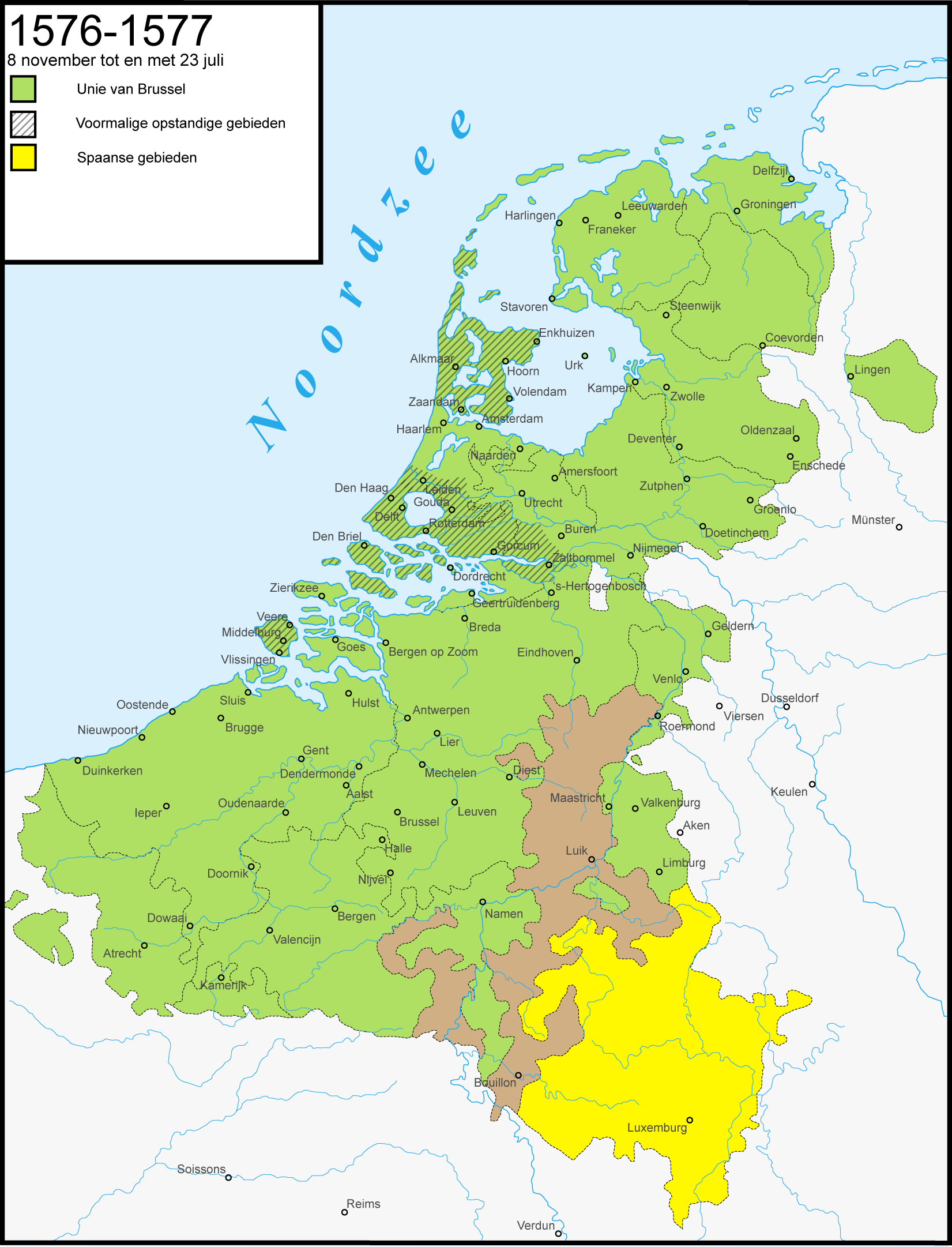Union of Brussels on:
[Wikipedia]
[Google]
[Amazon]
 There were two Unions of Brussels, both formed in the end of the 1570s, in the opening stages of the Eighty Years' War, the war of secession from Spanish control, which lasted from 1568 to 1648.
There were two Unions of Brussels, both formed in the end of the 1570s, in the opening stages of the Eighty Years' War, the war of secession from Spanish control, which lasted from 1568 to 1648.
 There were two Unions of Brussels, both formed in the end of the 1570s, in the opening stages of the Eighty Years' War, the war of secession from Spanish control, which lasted from 1568 to 1648.
There were two Unions of Brussels, both formed in the end of the 1570s, in the opening stages of the Eighty Years' War, the war of secession from Spanish control, which lasted from 1568 to 1648. Brussels
Brussels (french: Bruxelles or ; nl, Brussel ), officially the Brussels-Capital Region (All text and all but one graphic show the English name as Brussels-Capital Region.) (french: link=no, Région de Bruxelles-Capitale; nl, link=no, Bruss ...
was at that time the capital of the Spanish Netherlands
Spanish Netherlands (Spanish: Países Bajos Españoles; Dutch: Spaanse Nederlanden; French: Pays-Bas espagnols; German: Spanische Niederlande.) (historically in Spanish: ''Flandes'', the name "Flanders" was used as a ''pars pro toto'') was the H ...
.
First Union of Brussels
The northern counties ofHolland
Holland is a geographical regionG. Geerts & H. Heestermans, 1981, ''Groot Woordenboek der Nederlandse Taal. Deel I'', Van Dale Lexicografie, Utrecht, p 1105 and former province on the western coast of the Netherlands. From the 10th to the 16th c ...
and Zeeland
, nl, Ik worstel en kom boven("I struggle and emerge")
, anthem = "Zeeuws volkslied"("Zeelandic Anthem")
, image_map = Zeeland in the Netherlands.svg
, map_alt =
, m ...
rebelled in 1572, when Calvinists took over control of most of the cities. The Spanish army tried to reconquer them but failed during the Siege of Leiden
The siege of Leiden occurred during the Eighty Years' War and the Anglo–Spanish War in 1573 and 1574, when the Spanish under Francisco de Valdez attempted to capture the rebellious city of Leiden, South Holland, the Netherlands. The siege fai ...
in 1574. In 1575 Philip II Philip II may refer to:
* Philip II of Macedon (382–336 BC)
* Philip II (emperor) (238–249), Roman emperor
* Philip II, Prince of Taranto (1329–1374)
* Philip II, Duke of Burgundy (1342–1404)
* Philip II, Duke of Savoy (1438-1497)
* Philip ...
had to declare bankruptcy. As a result, the Spanish soldiers did not receive any payment, and they mutinied, pillaging the countryside of Brabant Brabant is a traditional geographical region (or regions) in the Low Countries of Europe. It may refer to:
Place names in Europe
* London-Brabant Massif, a geological structure stretching from England to northern Germany
Belgium
* Province of Bra ...
and Flanders
Flanders (, ; Dutch: ''Vlaanderen'' ) is the Flemish-speaking northern portion of Belgium and one of the communities, regions and language areas of Belgium. However, there are several overlapping definitions, including ones related to cultu ...
and the city of Antwerp, where 10,000 inhabitants in a city with 100,000 people were killed by the Spanish soldiers, who tried to kill all the local Protestants.
This event discredited the Spanish army enormously. The Estates-General of the Netherlands
The States General of the Netherlands ( nl, Staten-Generaal ) is the supreme bicameral legislature of the Netherlands consisting of the Senate () and the House of Representatives (). Both chambers meet at the Binnenhof in The Hague.
The States G ...
, sitting in Brussels, wanted to end the war in 1577. However, some of the fervently Roman Catholic provincial Estates did not want to invite the Calvinists of Holland and Zeeland to join. The Estates-General, without Holland and Zeeland, founded the first Union of Brussels. King Philip II of Spain agreed with this.
Second Union of Brussels
The leader of the resistance, William of Orange, went to Brussels in 1577 to try to convince the General Estates to accept the Calvinist provincial Estates of Holland and Zeeland. The population of Brussels celebrated him as a hero, and it was with his urging that the General Estates accepted the two counties. Turmoil broke out in the Netherlands when the news spread throughout the realm. Calvinists took over the cities in Flanders and in other provinces of the Netherlands, but the estates of the eastern provinces did not accept this. The French-speaking provinces in the south started the pro-SpanishUnion of Arras
The Union of Arras (Dutch: ''Unie van Atrecht'', French: ''Union d'Arras'', Spanish: ''Unión de Arrás'') was an alliance between the County of Artois, the County of Hainaut and the city of Douai in the Habsburg Netherlands in early 1579 during ...
in 1579, when the French-speaking Protestants were driven out. The Stadtholder of Groningen and Drenthe supported the king, and the city of Amsterdam
Amsterdam ( , , , lit. ''The Dam on the River Amstel'') is the capital and most populous city of the Netherlands, with The Hague being the seat of government. It has a population of 907,976 within the city proper, 1,558,755 in the urban ar ...
did as well. The Calvinists had taken over most of the Netherlands and they created the Calvinist Union of Utrecht
The Union of Utrecht ( nl, Unie van Utrecht) was a treaty signed on 23 January 1579 in Utrecht, Netherlands, unifying the northern provinces of the Netherlands, until then under the control of Habsburg Spain.
History
The Union of Utrecht is r ...
the same year. The Union of Brussels came to an end. Most of Brabant including the city of Brussels were neutral. The General Estates, which were dominated by Calvinists, fled from the Spanish army to Antwerp.
References
{{DEFAULTSORT:Union Of Brussels Eighty Years' War (1566–1609) History of the Low Countries